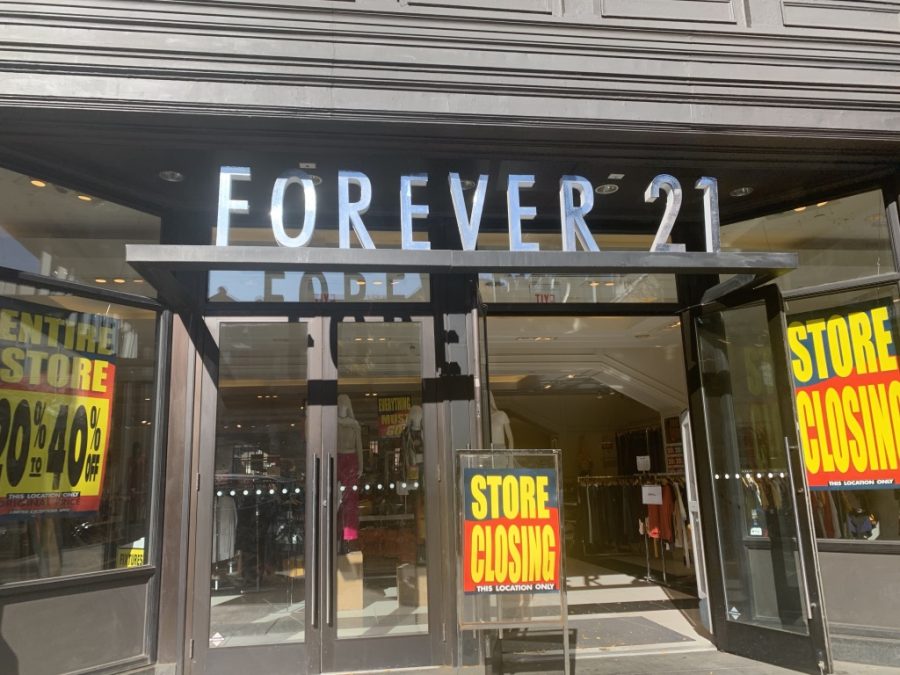Forever 21 fails to adapt to increasingly conscious Gen Z consumption
The Forever 21 on Newbury Street features signage revealing that the location is closing, a result of the company filing for Chapter 11 bankruptcy in September.
November 14, 2019
Generation Z, or Gen Z, once flocked to Forever 21’s revolving collection of trendy clothing that hung haphazardly from its cluttered racks. Now, the location on Newbury Street, plastered in bright “store closing” posters, is in its final days.
The once-popular fast fashion retailer, which targets a young adult audience, announced in late September that it filed for Chapter 11 bankruptcy. As a result, it will close 200 stores, including the Newbury Street location, which has yet to set a closing date.
Forever 21 isn’t the only prominent retailer in trouble. In what is being called the “retail apocalypse,” businesses across several industries, including fashion brands such as Topshop, Payless and Charlotte Russe, have shuttered stores or filed for bankruptcy over the past couple years. The decline of these fashion giants marks a shift in the industry and the behavior of its customer base.
Forever 21 is a fast fashion brand, meaning it quickly and cheaply produces clothing to keep a constant flow of what is “in style” on its shelves. But younger consumers, who comprise the company’s target market, increasingly align their social and environmental beliefs with their shopping habits, according to the State of Fashion 2019 report. So as consumers become more aware of the devastating effects of fast fashion on the environment and garment workers, they are less likely to be loyal to the brand.
Daniele Mathras, an associate teaching professor of marketing at Northeastern, indicated that young adults are getting more involved with trends like the capsule wardrobe, a collection of essential garments that can be worn for multiple occasions. Another rising trend is author and organizing consultant Marie Kondo’s innovative method of minimizing, which involves only holding onto pieces that “bring you joy.” People are less interested in the trendy, easily-disposable garments Forever 21 specializes in and are more drawn to pieces that support their identity, Mathras said.
“So much of what we do is to create this personal brand,” Mathras said. “I don’t think Forever 21 was resonating with their target market anymore.”
Fifth-year nursing major Sarah Chung, who shops online for the basic garments she used to purchase at Forever 21, echoed this sentiment.
“Now they have the weird logos, and they’re trying a little too hard to try to appeal to the masses,” she said.
One value Gen Z shares is sustainability, which is only expected to grow with the expansion of initiatives that bring awareness about poor practices in the fashion industry.
Northeastern’s Fashion and Retail Society facilitates discussions and activities related to every part of the fashion industry. The club “made it a big part of our mission to educate people” on the fast fashion issue, said president Aneri Shah.
Fashion and Retail Society has held sustainability panels in the past, but this year’s was more in-depth, Shah said. It broke down the effects of fast fashion, the benefits of ethical sourcing and how to upcycle.
“People aren’t going to completely stop, but I think a lot of people have thought about it more and have started buying a lot less from these [fast fashion] stores,” Shah said.
Fashion Revolution — a global not-for-profit movement that demands increased sustainability, ethics and transparency in the fashion industry — is also working toward similar goals. Kathleen Grevers, a graduate student at NU and director of U.S. education and global programming for the organization, works to bring awareness to high school students. Through her research, she found that the cultural mindset needs to shift to conscious consumption.
“If somebody pays what a piece of garment is actually worth, and they take pride in the ownership of that piece, that piece will last a long time,” Grevers said.
Jonty Harrison, marketing director of Fashion and Retail Society, adheres to this mentality. While he doesn’t claim to make shopping decisions based on sustainability, Harrison is mindful of the garments he buys and extends the lifespan of his clothes by wearing them until they appear worn out.
“When I buy a piece, it has to be one I really like,” Harrison said.







